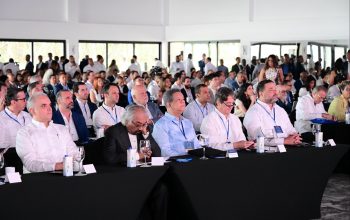news
“We need everyday people to be involved in sustainable development,” Says Glenn Denning
April 22, 2015
Director of the New York office of the Sustainable Development Solutions Network (SDSN) spoke on a climate change and sustainable development panel organized by GFDD/Funglode in honor of Earth Day
Glenn Denning, director of the New York office of the Sustainable Development Solutions Network (SDSN), said the goals of sustainable development cannot be just a document, that they have to be more than a call to action. “There must be
a way for them to be implemented and for that, financing is necessary,” he said.
Mr. Denning traveled from New York to the Dominican capital to take part in a panel organized by GFDD/Funglode in honor of International Earth Day. The panel was entitled, “It is our turn to be leaders: Climate Change and Sustainable Development.”
Continuing on the topic of financing, Mr. Denning said: “These resources must come from taxes, international aid and commercial and private financing.” He later added that, “we need very specific agreements; we need institutions, companies, universities, civil society; we need everyday people to be involved in sustainable
development.”
During the April 22nd panel, organized by the Global Foundation for Democracy and Development (GFDD) and Fundación Global Democracia y Desarrollo (Funglode), through its Study Center for the Environment and Sustainable Development, Denning said the path to sustainable development must fulfill three principles: economic growth, social justice and environmental sustainability.
Denning, professor of Professional Practice at the
School of International and Public Affairs (SIPA) at Columbia University, stressed that environmentalists are more focused on environmental conservation and preservation of biodiversity. But he believes that they should also take into account “opportunities for sustainable growth and include this in that framework.”
He also explained that the network he runs, of which GFDD/Funglode President and former President of the Dominicana Republic, Leonel
Fernández, is a member, was established by UN Secretary General Ban Ki-moon in August 2012 with the idea of mobilizing scientists and experts to provide technical and scientific support on sustainable development to the United Nations, universities and other entities.
In concluding, Mr. Denning said it is important to reach out to young people. “Young people are crucial because they are going to see the results of how serious we have been in these meetings and
what we have done.”
More panelists
Others on the panel with Mr. Denning included Mr. Omar Ramírez, Executive Vice President of the National Council for Climate Change and Mechanism for Clean Development (CNCCMDL in Spanish) of the Dominican Republic and Mr. Emil Chireno, Executive Director of the Dominican Association of the United Nations (ANU-RD). Several young environmentalists presented their proposals in favor of
sustainable development in the Dominican Republic. The panel was moderated by María Victoria Abreu Malla, manager of International Affairs and Socioeconomic Development of the GFDD.
After offering welcoming remarks, Ms. Abreu Malla introduced a video produced by the Inter-American Development Bank (IDB), “A Dangerous Climate,” which highlights the consequences of climate change. She also did a brief presentation of a GFDD book, Towards
Sustainable Development and the Green Economy in the Dominican Republic.
For his part, Omar Ramírez, Executive Vice President of the National Council for Climate Change and Mechanism for Clean Development (CNCCMDL), said “in a short time, the Dominican Republic has emerged as one of the leaders in the Caribbean in terms of climate change as a result of hard work and by participating in the Conference of the Parties to the United Nations Framework
Convention on Climate Change (UNFCCC).” In 2008, Mr. Ramírez explained that with the creation of the National Council for Climate Change and Mechanism for Clean Development, a positive step was taken down a different path, “because, for the first time in Latin America, a council led by a head of state was created.”
The Dominic Republic is still among the few countries in the world that treats climate change as a mainstream issue in the
Constitution of the Republic. “Other countries always ask us how we did that,” said Ramírez.
Maria Eugenia Morales, official in the Department of Environment and Energy of the United Nations Development Program (UNDP), said environmental sustainability and climate change are not externalities and it is not the only job of the Environment Ministry.
Ms. Morales said the Strategic Plan of the UNDP contributes to sustainable development.
“We promote maintenance and protection of natural capital, development of low carbon strategies, human, environmental and economic resilience in the face of risks and threat of climate change,” she stressed.
Meanwhile, Attorney Gina Rosario, of the Caribbean Youth Environment Network, shared her views on climate change. “Social and economic development will not be sustainable and achievable unless we have the environmental pillars,”
she said.
Ms. Rosario called on young people to get involved and become leaders. “This empowerment should be reflected in action, the creation of change and involvement in an international agenda.”
“To be able to achieve change, we must learn to create alliances and we need to commit as an important part of society,” stressed Rosario.
Emil Chireno, Executive Director of the Dominican Association
of the United Nations and responsible for the panel’s presentations, said that with these types of meetings Funglode and its various initiatives, seeks to improve the quality of public debate in the Dominican Republic, and therefore interacts and shares ideas with high level experts and specialists.
Presentations by:
Glenn Denning | Omar Ramírez Tejada | María Eugenia Morales
Related Links
www.funglode.org
www.unsdsn.org







